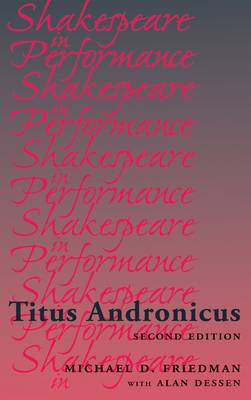
- Afhalen na 1 uur in een winkel met voorraad
- Gratis thuislevering in België vanaf € 30
- Ruim aanbod met 7 miljoen producten
- Afhalen na 1 uur in een winkel met voorraad
- Gratis thuislevering in België vanaf € 30
- Ruim aanbod met 7 miljoen producten
Zoeken
€ 153,95
+ 307 punten
Uitvoering
Omschrijving
Picking up in 1989, where Alan C. Dessen's celebrated study of the stage history of Shakespeare's Titus Andronicus left off, Michael D. Friedman's second edition adds an examination of twelve major theatrical productions and one film that appeared around the world in the following two decades. Friedman identifies four vital lines of descent in the recent performance history of the play: the stylised approach, which renders the play's savagery in a formalised manner; the realistic approach, which features literal and serious representations of bloodshed; the darkly comic approach, which takes full advantage of the play's opportunities for black humour; and the political approach, which uses the play as a vehicle to comment upon contemporary attitudes toward violence, warfare, and repressive governments. All of the productions covered by Friedman fit primarily into one of these catagories, but Julie Taymor's harrowing film Titus (1999), based upon her 1994 stage production at New
York's Theatre for a New Audience, incorporates elements from all four lines of descent, making it the most characteristic, as well as the most influential, contemporary performance of the play. Friedman's second edition extends Dessen's study to include an in-depth consideration of Taymor's widely-viewed film, along with chapters devoted to the efforts of major international directors including Gregory Doran, Silviu Purcarete, and Yukio Ninagawa. This expanded volume will prove essential to students of Shakespeare's play, along with scholars interested in the tragedy's gruesome yet occasionally comical performance history.
York's Theatre for a New Audience, incorporates elements from all four lines of descent, making it the most characteristic, as well as the most influential, contemporary performance of the play. Friedman's second edition extends Dessen's study to include an in-depth consideration of Taymor's widely-viewed film, along with chapters devoted to the efforts of major international directors including Gregory Doran, Silviu Purcarete, and Yukio Ninagawa. This expanded volume will prove essential to students of Shakespeare's play, along with scholars interested in the tragedy's gruesome yet occasionally comical performance history.
Specificaties
Betrokkenen
- Auteur(s):
- Uitgeverij:
Inhoud
- Aantal bladzijden:
- 328
- Taal:
- Engels
- Reeks:
Eigenschappen
- Productcode (EAN):
- 9780719082528
- Verschijningsdatum:
- 30/06/2013
- Uitvoering:
- Hardcover
- Formaat:
- Genaaid
- Afmetingen:
- 140 mm x 213 mm
- Gewicht:
- 521 g

Alleen bij Standaard Boekhandel
+ 307 punten op je klantenkaart van Standaard Boekhandel
Beoordelingen
We publiceren alleen reviews die voldoen aan de voorwaarden voor reviews. Bekijk onze voorwaarden voor reviews.











